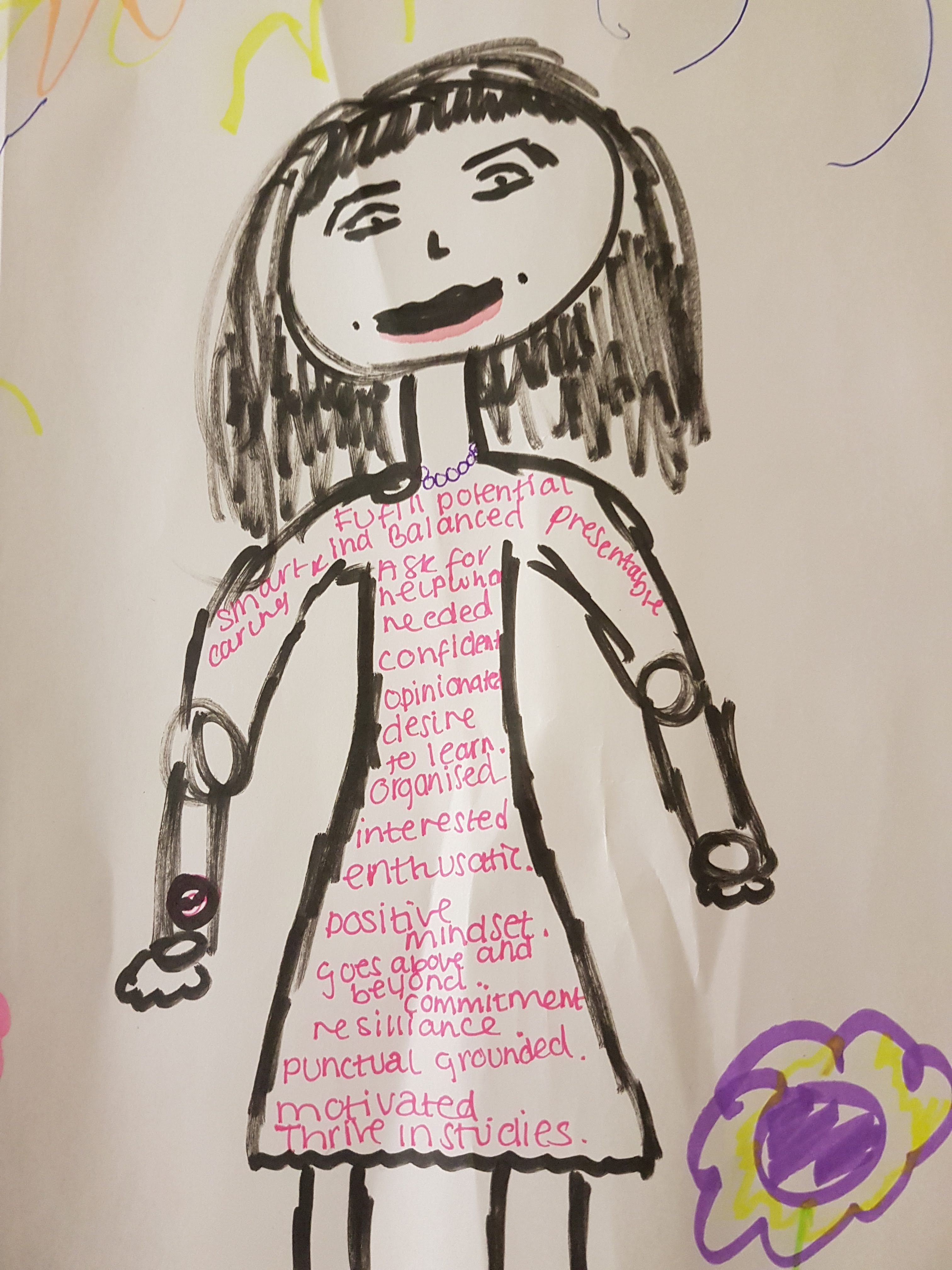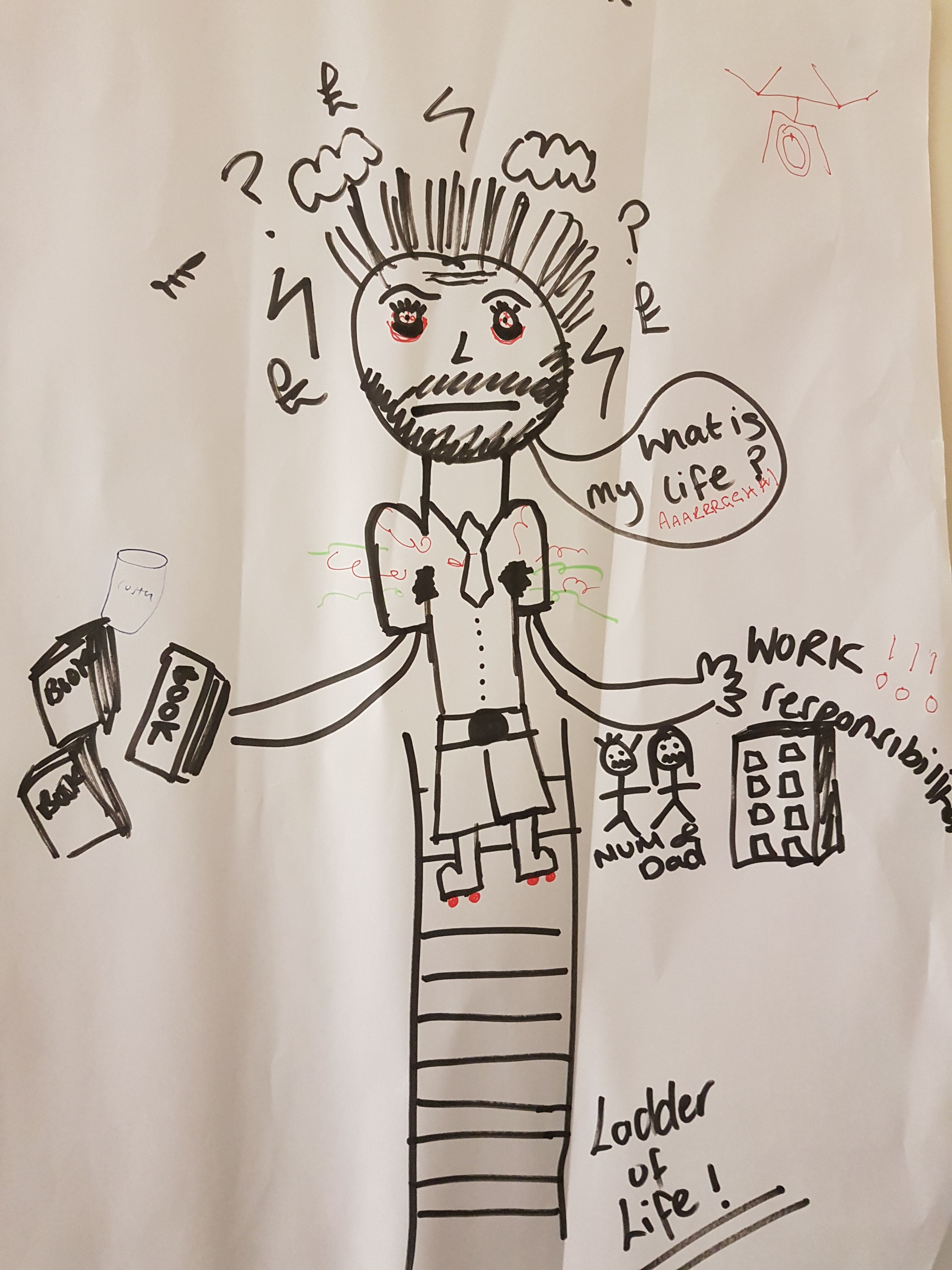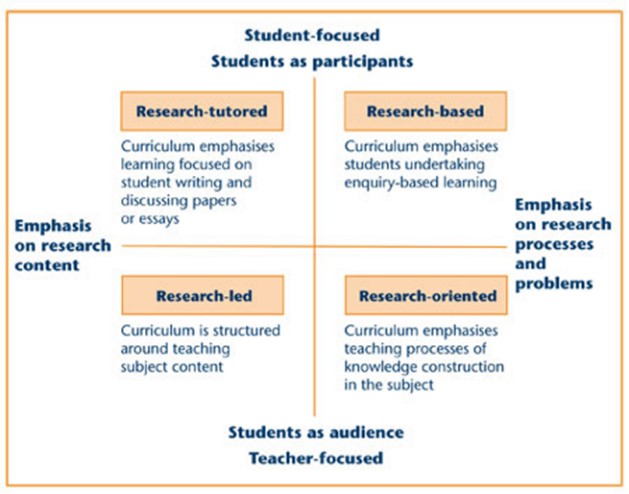This #Take5 post is brought to you by Helen Hewertson … who works at a large post 92 UK University. She is the main person responsible for the day-to-day running of the foundation programme in Humanities and Social Science and is module leader for and teaches on all the core modules. There is a cohort of between 40-100 students per core module which cover topics like study skills, critical thinking, research methods and digital literacy.
 Helen’s student’s drawing
Helen’s student’s drawing
Start here
“The foundation entry degree was probably the best thing I did. After being out of education for so long (15 years) this entry point gave me an opportunity to gain invaluable experience in creating university level pieces of work, practise my presentation skills and make lifelong friends.” Student 1
Foundation entry is an additional year to prepare students before they start the first year of their full degree. Foundation entry has a wide variety of students from different backgrounds. My university has a high proportion of widening participation students. A lot of the students are unfamiliar with the demands of university and how it is different to what they’ve done before. So the foundation year is pivotal in getting them used to the way university works and what is expected of them. We develop students with a scaffolded approach with more support in semester one and more independent learning and group work in semester two. In my practice, I’m heavily influenced by an academic literacies approach and by work from Paulo Freire, Pierre Bourdieu, Lisa Delpit, and Kimberle Crenshaw among others.
This Blog looks at strategies for inclusion and transition for widening participation students starting university through a foundation entry programme.
What makes a really good student anyway?
The aim for these students is to give them the tools and confidence to succeed at university. We might discuss what makes a really successful, learner/student, and students draw what they think. They start with a typical student, and then a really successful student.

Helen’s student’s drawing
We also utilize the teaching styles that they are likely to come into contact with. I generally use lectures for giving students relevant information and theory that will then be discussed in the seminars and put to practical use.
The second lecture for the study skills module is on academic reading, where we discuss different conceptions of reading. We then look at relevant journal articles and have discussions about academic reading and referencing in subsequent seminars. It is important that students feel engaged and included. I use my research informed teaching background to find relevant journal articles I can use with the students that gets them used to how academic writing works. An example of this is the Building a Scholar in Writing model by Bailey et al. (2015). The students find the metaphor used in this model very useful when checking what they need to cover for an essay.
Research-informed Teaching
The figure below on curriculum design and the research-teaching nexus, by Healey et al. (2007) has been pivotal in developing my modules. The study skills module, is focused around the research-tutored, research-oriented and research-led sections. Whilst other modules can utilise all four aspects of the model. This helps the students feel engaged and practically apply any knowledge they are taught.

Figure 1 Curriculum design and the research-teaching nexus (Healey et al 2007)
Tensions and Tools
It is important when teaching to consider inclusion and the appropriate use of learning technologies for engagement as we can no longer just stand at the front talking at students (which of course LDers don’t do!) when you have an increasingly diverse cohort. More active learning has been shown to be beneficial for all students (Theobald et al., 2020).
One of the tensions is in my delivery in lectures. I have to be very careful to make sure that I don’t move around too much and talk too fast, especially if there is a BSL (British Sign Language) interpreter for deaf students as it takes longer to sign something than to speak it.
Videos are useful learning tools as it helps break up the lecture and supports student engagement. (Sherer & Shea 2011). I make sure that if I am using videos they are subtitled, however, there is a lack of relevant resources with subtitles. TED talks are useful and come with subtitles in many languages. This is useful for international students, as helps to remove the language barrier.
All these videos and slides are on the VLE a few days before the lecture. This and other adjustments enables inclusive pedagogy, extending what is generally available to everybody regardless of background or need (Florian and Black-Hawkins 2010).
Reflection- what am I doing here?
Getting students to reflect on their learning is an important step in their learning journey. “Critical reflection requires us to ponder our practices, processes, and identities. It also requires us to look beyond our own circumstances to the external factors, policies, and people that might influence the choices we make and the actions we take.” (Sutherland 2013 p.111) This is important, as with research and group work there can be many external factors that influence us, not to mention our personal lives. It is about acknowledging the successes, but also the challenges we face and developing strategies that work that can help us in the future.
For one module they are expected to submit a reflective diary about the learning journey and experiences of group work and research. We discuss models of reflection in class in semester 2 (see also https://lmutake5.wordpress.com/2020/01/30/take5-39-the-best-way-to-surf-the-reflective-wave/) and do an activity around identifying reflection in sample pieces of writing. The insights the students develop about their own learning practices and skills shows how useful this process of reflection is because many would have not come to this realisation if not for the reflective assignment.
In my school we are required to give two assessments per module. I try to set assessment for learning not just of learning. Sadler (1998) talks about the importance of formative assessment. I use this to set an essay plan in HUC110 which catches most issues before the final assessment. After getting formative feedback on the essay plan, we look at examples of past essays and then mark them using the marking criteria.
With the essay I require a self-evaluation based on Rust (2002). This new module structure I developed allows them better insight into how academic work is structured and marked, as well as promoting self-reflection on their work. This is useful to promote metalearning and develop employability skills. Module evaluations show these practices work for most students.
What the students said
“I told so many people that I’m glad I did a foundation year before starting my degree. It just easier way to make that bridge between A levels and degree!” S4
Students tend to be very unconfident when they start university especially in foundation year. So one of the main successes of foundation entry is being able to build student confidence, so they are familiar with ways of being and belonging at university. They develop a support network, and know where to get help when needed. It gives students insight into academic skills development and how to navigate the university environment for students who come from widening participation backgrounds. We have a good retention and completion rate, and our students are more likely to get a degree than the national average.
I recently did a survey of previous foundation students, to see if doing the foundation entry year has helped them in their degree. Some student feedback is detailed below:
“I currently present the psychology departments student experience talks, along with other foundation entry students. We sing its praises throughout our talks. In my opinion this shouldn’t be an option if you don’t get the grades you require or you haven’t been in education for a while but should be integrated into the standard degree. The skills we learnt within the foundation year have set us up perfectly for university life and we all feel like we had an advantage compared to the other first year entry students.” Student 1
“The Foundation course was the first step which prepared me for the degree course. It not only provided me the academic support, but moral and psychological support as well. When I started the course, I was not confident enough, but the foundation course was the founding step which helped me to grow. After finishing the foundation year, I have completed the Year 1 and 2 successfully, and now I am in the final year. Thanks to all the academic staff of foundation year for helping me out to move forward.“ Student 2
“Foundation year really prepared me for my first year. It gave me more confidence to approach staff members for any issues I had. The greatest help was in preparing me for my essays. I do believe I would have had much lower grades if I would not have taken the foundation course.” Student 3
“We did have some really interesting lectures which really fired my enthusiasm for learning. In addition to the subject based ones, I also thought study skills and, was the other one called developing academic knowledge were very useful. They helped refine the skills needed to produce work of the required standards. It was really great to have the opportunity to have a taster year of academic life before it was all full on! I can honestly say that the foundation is a great way to increase skills and confidence.” Student 5
Your Turn
My advice would be that if you are considering how to make your lessons more inclusive, then think about the diverse cohort and what strategies you can put in place to make sessions more active and participatory. Are there any barriers to inclusion in the setting? Have you thought about inclusion for not just disabled students, but those from diverse backgrounds who might have had no experience of higher education before, and no idea of what to expect? My big tip would be to have a look at the theorists I mentioned and think through how reflection and research-informed teaching can make a difference to designing your modules or courses. Good luck!
Bio/Blurb
Helen Hewertson is a fellow of the Higher Education Academy and has taught at various levels and to learners with various abilities and ages. She is currently teaching on the Foundation programme in the School of Humanities, Language and Global Studies, and is module leader for several modules. Helen is also the Chair of the Pedagogic Research Forum and is passionate about educational research and inclusive teaching.
References
Bailey, A., Zanchetta, M., Velasco, D., Pon, G. and Hassan, A. (2015) ‘Building a scholar in writing (BSW): A model for developing students’ critical writing skills.’ Nurse Education in Practice, 15(6) p. 524–529.
Campo, Negro and Núñez (2013) Use and Abuse of Audiovisual Media in the College Classroom. Slides Show and Web Pages Procedia – Social and Behavioral Sciences 93 p.190-194
Freire, P. (1992) Pedagogy of the Oppressed. London: Penguin Edition
Florian, L. and Black-Hawkins, K. (2011), Exploring inclusive pedagogy. British Educational Research Journal, 37, p.813–828. doi:10.1080/01411926.2010.501096
Jenkins, A. Healey, M. and Zetter, R. (2007) Linking teaching and research in departments and disciplines York: The Higher Education Academy Available from http://www.heacademy.ac.uk/assets/documents/teachingandresearch/LinkingTeachingAndResearch_April07.pdf Accessed on 03/10/08
Rust, C. (2002) Purposes and principles of assessment. LEARNING AND TEACHING BRIEFING PAPERS SERIES Oxford Centre for Staff and Learning Development. Accessed on 23/3/2017 available at https://www.brookes.ac.uk/services/ocsld/resources/briefing_papers/p_p_assessment.pdf
Sadler, D. R. (1989) Formative assessment and the design of instructional systems, Instructional Science, 18, p.119–144.
Sherer, P., & Shea, T. (2011). Using online video to support student learning and engagement. College Teaching, 59, p.56-59
Sutherland, K.A. (2013), “The importance of critical reflection in and on academic development”, International Journal for Academic Development, Vol. 18, No. 2, p. 111–113. https://doi.org/10.1080/1360144X.2013.802074
Theobald, E. J., Hill, M. J., Tran, E., Agrawal, S., Arroyo, E. N., Behling, S., Chambwe, N., Cintrón, D. L., Cooper, J. D., Dunster, G., Grummer, J. A., Hennessey, K., Hsiao, J., Iranon, N., Jones, L., Jordt, H., Keller, M., Lacey, M. E., Littlefield, C. E., Lowe, A., Newman, S., Okolo, V., Olroyd, S., Peecook, B. R., Pickett, S. B., Slager, D. L., Caviedes-Solis, I. W., Stanchak, K. E., Sundaravardan, V., Valdebenito, C., Williams, C. R., Zinsli, K. and Freeman, S. (2020) ‘Active learning narrows achievement gaps for underrepresented students in undergraduate science, technology, engineering, and math.’ Proceedings of the National Academy of Sciences, March, p. 201916903.
